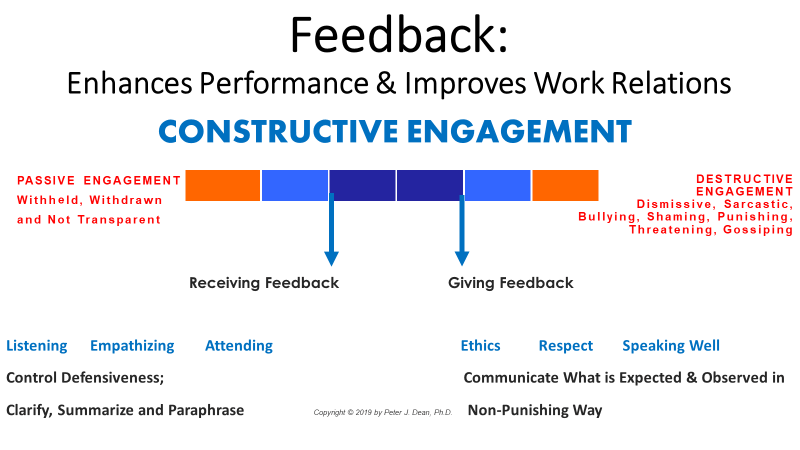“What is feedback?” the client asked.
“It is an interpersonal exchange that is intended to improve performance and develop stronger human relations at work,” I said.
“That is not what it is at my corporation,” the client said.
“Help me understand how you see feedback,” I replied.
“I am not sure what feedback is supposed to be. All I know is how I feel when someone uses the word ‘feedback’ or tells me they have feedback for me.”
“What is that feeling?”
“It is not a good feeling, physically or psychologically. Physically, I feel my heartbeat increase, my breathing becomes strained, and my muscles tighten up and stay tense. And psychologically, I feel defensive and distracted.”
This exchange I had while coaching a client demonstrates what can happen when feedback systems are set up poorly. The value of such discussions can be lost to the misunderstanding of what feedback is. There are two major blind spots that can lead to this failure.
The first I call “destructive engagement,” where the deliverer of feedback uses a tone that is punishing, dismissive, sarcastic, bullying, shaming, or threatening. When someone hears feedback communicated in this way, they feel stress from hormones such as cortisol coursing through the body and prompting the survival emotions of “fight, flight, or freeze” to dominate. That stressful state blocks them from using nondefensive listening, limits the practice of empathy, and denies them the ability to devote their full attention to the feedback itself. When a manager or leader comes across as punishing or threatening in any way, the receiver often feels a lack of openness to the feedback. In other words, the manager’s words fall on deaf ears.
The second blind spot is what I call “passive engagement,” where the deliverer of feedback bestows their thoughts in a way that is withdrawn and withheld—not feedback at all. It almost is like the deliverer is saying, “guess what the feedback is.” Or, if they do give feedback, it isn’t clear or transparent, but instead mostly generalized and hidden in vagueness.

Both “destructive engagement” and “passive engagement” limit the value of feedback. Neither one truly engages in an effective way with words that are specific and non-punishing.
On the other hand, constructively engaging with others when requesting, receiving, and giving feedback properly prevents the survival emotions from dominating. Feedback requires the skills of listening without being defensive, offering empathy and honest patience, suspending judgment, attending fully to others, paraphrasing content to clarify areas of confusion, providing clear expectations, and lastly, asking for feedback about yourself. Using these skills not only enhances understanding and performance, but also sends the message within a firm that respect is important.


























